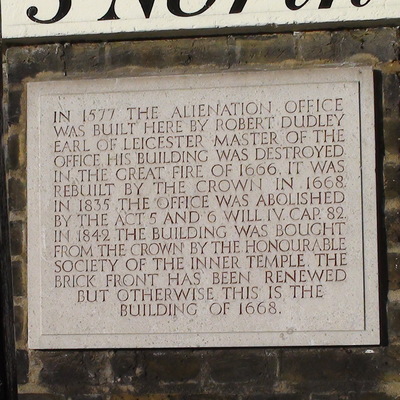Under the feudal system the King owned all land and others could only hold it as the King's tenants. Transfers between tenants were known as 'alienations' and this required a licence from the King. Robert Dudley set up an office to manage this system, and to collect the fees and fines. Its role changed and shrunk over the years and by 1835 the system of land conveyancing meant that the Alienation Office could be abolished.
This section lists the memorials where the subject on this page is commemorated:
Alienation Office
Commemorated ati
Alienation Office
"Act 5 and 6 Will. IV.Cap.82" refers to a legal instrument created during the...
Other Subjects
Admiral, Sir R. Goodwin Keats, GCB
Naval officer. Born Hampshire. Governor of Greenwich Hospital, 1821 until his death there. The Greenwich monument has his name spelt 'Keates'; all other sources have 'Keats'.
William Edwardes, 2nd Baron Kensington
Second Lord Kensington. He served as member of parliament for Haverfordwest from 1802 to 1818. He was the instigator of the failed Kensington Canal. Constructed in 1828 it was replaced with rail tr...
A. E. Orchard-Lisle
Property expert and Vice-Chairman of the Board of Guy's Hospital in 1964.
Councillor W. W. Paton
JP and Mayor of West Ham 1951-52. Also a Reverend.
Sir William Prichard
Alder President associated with St Bartholomew's Hospital in 1702. A director of the slave trading Royal African Company and a governor of the colonial Irish Society.
Previously viewed
Bermondsey Abbey
SE1, Tower Bridge Road
Bermondsey Abbey The Cluniac (Benedictine) Priory of St Saviour at Bermondsey occupied ground between Bermondsey Street, Abbey Street and...





Comments are provided by Facebook, please ensure you are signed in here to see them